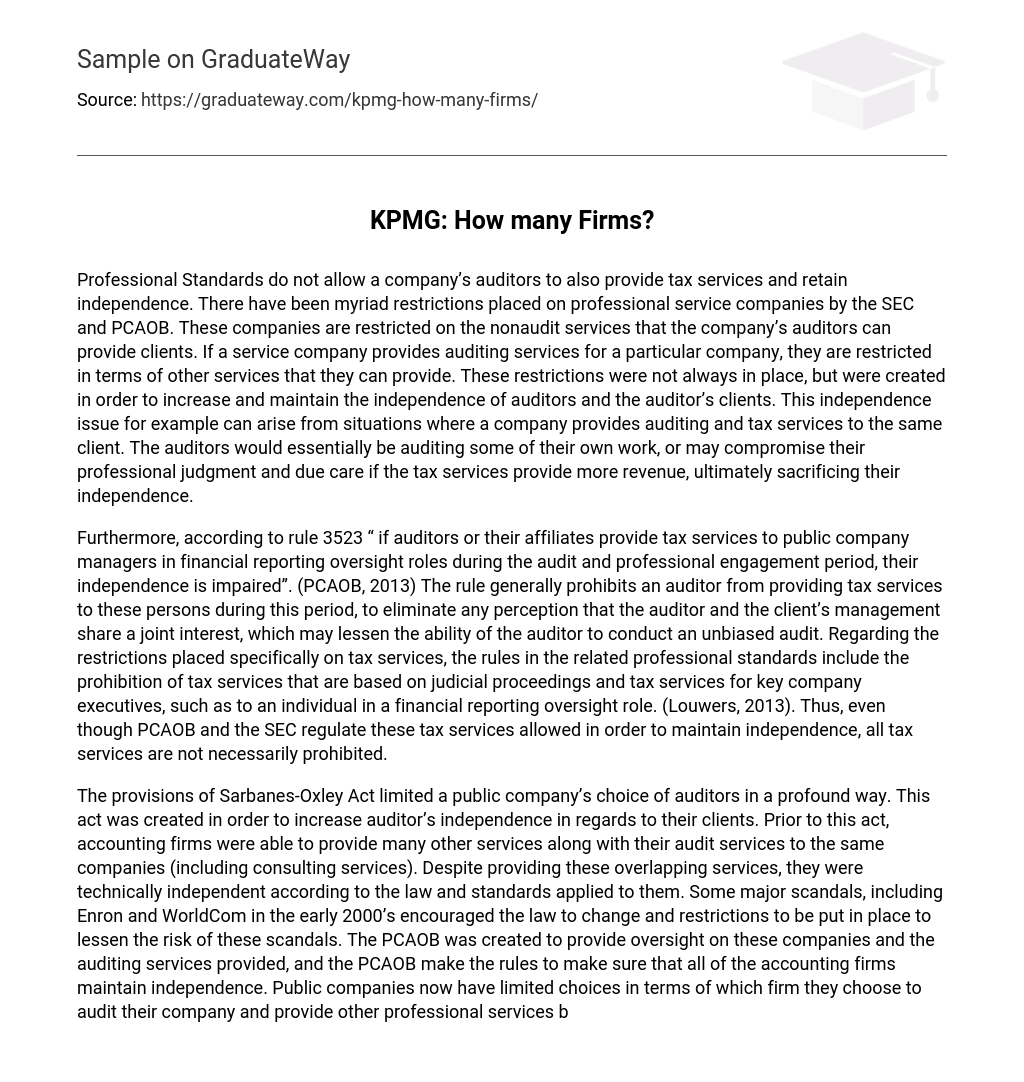Professional Standards do not allow a company’s auditors to also provide tax services and retain independence. There have been numerous restrictions placed on professional service companies by the SEC and PCAOB, limiting the nonaudit services that auditors can offer clients. If a service company performs auditing services for a specific firm, they face limitations on other services they can provide. These restrictions were implemented to bolster and preserve the independence of auditors and their clients. For instance, offering both auditing and tax services to the same client can introduce conflicts of interest, as auditors would essentially be reviewing their own work, potentially compromising their professional judgment and due care, especially if tax services yield more revenue, endangering their independence.
Additionally, rule 3523 states that if auditors or their affiliates provide tax services to public company managers in financial reporting oversight roles during the audit and professional engagement period, their independence is impaired (PCAOB, 2013). This rule aims to prevent any perception that the auditor and the client’s management share a common interest, which could compromise the auditor’s ability to conduct an unbiased audit. The professional standards also prohibit certain tax services, including those based on judicial proceedings and those provided to key company executives in financial reporting oversight roles (Louwers, 2013). It is important to note that while PCAOB and the SEC regulate these tax services to maintain independence, not all tax services are prohibited.
The Sarbanes-Oxley Act significantly impacted a public company’s auditor options. Its purpose was to enhance the independence of auditors from their clients. Previously, accounting firms were allowed to offer various additional services, such as consulting, alongside their audit services for the same companies. Despite being legally considered independent and following applicable laws and standards, scandals like Enron and WorldCom prompted changes in the law. These changes introduced restrictions to minimize such scandals’ occurrence.
Consequently, the Public Company Accounting Oversight Board (PCAOB) was established to oversee these companies’ auditing services. The PCAOB sets regulations to ensure that all accounting firms maintain their independence. As a result, public companies now have limited choices when selecting an auditing firm that can also provide other professional services. They are prohibited from using the same firm for multiple services.
There are advantages and disadvantages to allowing auditors to provide nonaudit services, such as tax services, to their audit clients. On the positive side, it offers convenience for the client by having only one firm handle their company, reducing communication with multiple companies. The auditor’s deep understanding of the client enables them to provide tailored services without extensive background knowledge, saving time and costs for both parties involved. Furthermore, this widens the options for service providers that companies can choose from. However, imposing restrictions on the types of services provided can make it difficult for a company to switch firms or decide on service providers.
There are several drawbacks associated with auditors providing other services. One major concern is the perceived lack of independence that may arise when they audit their own work, creating a conflict of interest. Moreover, since many of these additional services involve management functions, it raises an independence issue. Furthermore, their work might be seen as favoring the client, which compromises their objectivity. The absence of independence can also lead auditors to permit inappropriate accounting treatments if they have developed a close relationship with the company or rely excessively on another source of income (referred to as a “familiarity threat”).
The presence of a smaller number of major international accounting firms may have a significant impact on public companies. It becomes more burdensome to select and change service providers. For instance, this was evident in the case of Intel Corps.’ Issue in 2005 when they wished to switch auditors. However, they had only the Big 4 firms to choose from. Ernst and Young had been auditing their statements for over 30 years, while the other Big 4 firms offered non-audit services to Intel. Ultimately, Intel decided to stick with Ernst and Young as their auditors because it was a less complicated option. According to Intel’s corporate secretary, the limited number of large multinational audit firms providing the necessary work made it difficult to switch auditors without triggering other consequences. Sarbanes Oxley requires firms to maintain their independence, and if a firm provided non-audit services to Intel and they wanted to hire them for auditing, the firm would have to cease the non-audit service and Intel would need to find a new provider. This adds complexity for public companies as they have limited options for the various services they require.





